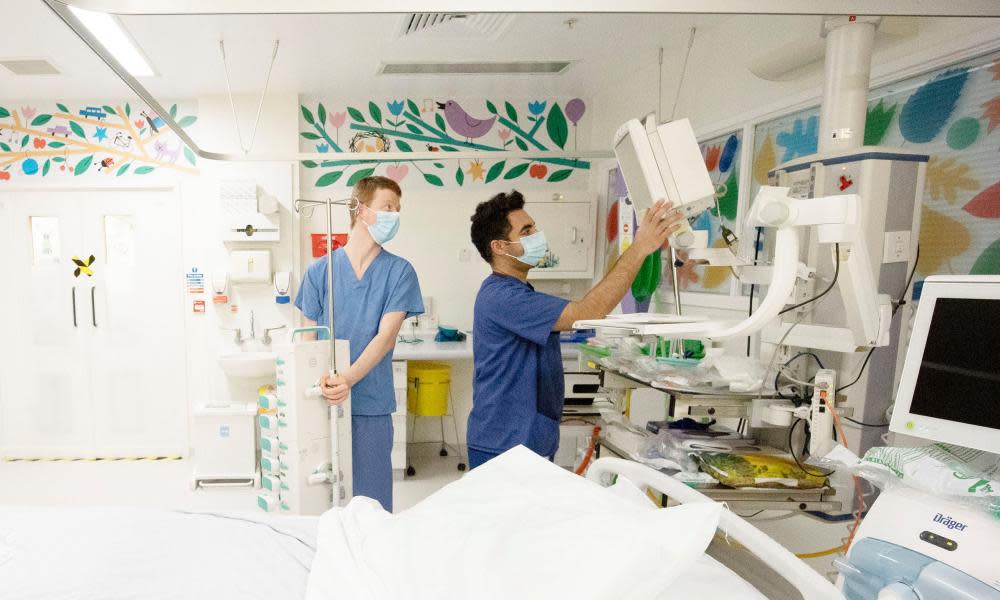A&E units in UK report rapid rise in children’s infections

A&E units are treating a sudden surge in young children suffering from infections usually only seen in winter after the rules on social contact were relaxed, doctors have revealed.
Anxious parents are bringing in preschool age children who have a high temperature and difficulty breathing, increasing demand on emergency departments that are already “overwhelmed”.
“On Monday, we set a new record for the number of children seen in 24 hours in our department, and that’s in the middle of summer,” said Dr Dan Magnus, a consultant in children’s emergency medicine at Bristol Royal hospital. “We are effectively running a winter-level emergency department response in the summertime.”
Similarly, the number of children attending Watford general hospital with fever has shot up from about 20 a week in early February to more than 100 a week earlier this month.
Dr Richard Burridge, a consultant paediatrician and lead for the children’s A&E, said: “We’re seeing three times the number of children with fevers for early June than in 2020, which was lower because of Covid, and twice the number of children we saw in June 2019, significantly higher than we’ve seen before in children’s [emergency department].”
Related: ‘A small, sanitised existence’: what effect will the pandemic have on today’s babies?
Most of the children involved are looked after by relatives or attend daycare facilities such as nurseries and are not yet at school. They typically have a generally minor breathing condition such as respiratory syncytial virus (RSV), bronchiolitis, paraflu or rhinovirus, the symptoms of which are a cough, runny nose and fever.
“These infections, which are usually mild, are mostly seen in the winter months. But the easing of lockdown has meant that children are being exposed to them this summer as they come back into contact with other children,” said the Royal College of Paediatrics and Child Health.
A survey undertaken at Leicester Royal Infirmary and the specialist children’s hospitals in Glasgow, Birmingham and Liverpool shows that 23,661 children attended A&E in May – the highest number for that month in years. In 2019, before Covid, 21,046 came for help. While more than 70% are deemed able to wait to see a doctor, about 25% are judged to need urgent assistance.
Watch: COVID-19 - 'Really close call' on whether to vaccinate children, SAGE adviser says
Dr Camilla Kingdon, the college’s president, warned parents that children with those conditions may wait many hours in A&E to be seen because they are not seriously ill. Parents should seek help from their GP, local pharmacy or NHS111 rather than at A&E, she said.
“Many emergency departments are overwhelmed and there has been a particularly steep rise in the number of young children presenting. Some have seen the highest-ever numbers of children in their department and waiting times can be huge,” she said.
Under-fives returning to socialising at playgroups, nurseries and other settings lies behind the recent sharp rise, Kingdon added.
“What we’re seeing is a big rise in lots of the normal childhood infections that usually start in late September and into winter. But because of lockdown, many young children didn’t have any of these last winter when they weren’t mixing with other children.
“So there are a lot of these all going round at once and that’s very unusual for this time of year. In the same way, other countries – such as Australia – saw a rise of RSV and other respiratory infections when they eased lockdown, despite it being summer.”
The college, which represents specialist children’s doctors, sought to reassure worried parents and said that months of little or no social contact had not changed children’s immune systems.
Dr Liz Whittaker, its infectious disease lead, said: “We’re not concerned by this rise in infections. They are not more serious or unusual. It’s just that they are all happening now, instead of over the winter months, as children begin mixing again.
“Children’s immune systems are strong and some will never get sick with these viruses. They are certainly no more susceptible than they were before lockdown. It’s more that some parents have lost a little confidence in their own judgment, and that’s not surprising. Their children are fine, they just need reassuring.”
Prof Martin Marshall, the chair of the Royal College of GPs, advised parents to undertake “simple self-care measures” such as giving their child paracetamol or ibuprofen and using a GP, pharmacy or the 111 telephone advice line as the “appropriate first port of call”.
Dr Michelle Jacobs, of the Royal College of Emergency Medicine, which speaks for A&E doctors, warned that if parents whose child has these symptoms take them to A&E “there may be a long delay, potentially more than four hours, before being seen, which may be difficult and distressing for parents and children.”
An NHS spokesperson said: “The NHS in England has tried and tested plans for dealing with any rise in infections among children, and will continue to adapt them in line with further advice from Public Health England. If you need care and advice for your child, NHS 111, GPs, and pharmacies are available as well as A&E when it is needed”.
Watch: What UK government COVID-19 support is available?

 Yahoo News
Yahoo News 
